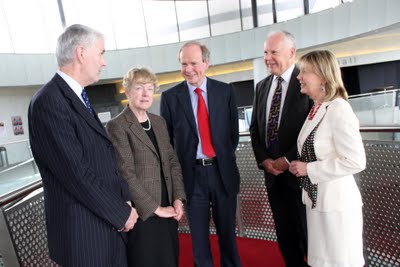
Reform of higher education in the Atlantic Isles: ‘like watching a slow motion car crash’?
On 16 May, Professor Sir Peter Scott, Professor of Higher Education, Institute of Education, London delivered a lecture Higher Education Reform in the Atlantic Isles: Similarities and Differences. This event was the fifth in a lecture series hosted by the Higher Education Research Centre (HERC) DCU, with support from the Higher Education Authority (HEA) and the Dublin Region Higher Education Alliance (DRHEA). The welcome address was given by the President of DCU Professor Brian MacCraith. The event was chaired by Professor Maria Slowey, Director of Higher Education Research and Development, DCU, with participants and expert panellists Dr Mary Canning, Deputy-Chair of the HEA, Professor Mike Grenfell, Chair (1905) of Education and Head of School, Trinity College Dublin, and Professor Richard O’Kennedy, Vice-President for Learning Innovation, DCU and current Chair of the Dublin Region Higher Education Alliance. Peter Scott set the scene for the comparative perspective by outlining the structure of the higher education systems in Ireland and the four jurisdictions of the United Kingdom (England, Scotland, Wales and Northern Ireland). Of particular interest is the fact that all five recently launched major policy reform initiatives: National Strategy for Higher Education to 2030 (Republic of Ireland, 2011), Building a Smarter Future: Towards a Sustainable Scottish Solution for the Future of Higher Education (Scotland, 2010), Review of Higher Education in Wales (Wales, 2009), Consultation Document on the Development of a Higher Education Strategy for Northern Ireland (Northern Ireland, 2011), Securing a Sustainable Future for Higher Education (Browne Report) (England, 2010) and New Coalition Government’s Proposals (England, 2010).

Professor Richard O'Kennedy, Vice-President for Learning Innovation, DCU, Dr Mary Canning, Deputy Chair, HEA, Professor Peter Scott, Institute of Education, London, Professor Mike Grenfell, Head of School of Education, TCD, Professor Maria Slowey, Director, Higher Education Research and Development, DCU
The almost simultaneous publication of these important reports raises a number of key questions. “To what extent do the commonalities (past and present) of these five higher education systems limit the scope for different solutions to similar problems? Are these different solutions best explained in terms of national or structural differences? Are these general lessons about processes of HE reform can be applied more widely?”
Peter Scott identified drivers of change and reform of higher education at three different levels. First, the generic drivers, which apply across all five systems, including, in particular those associated with the ‘massification’ of higher education. Second, important mid-range/regional drivers, which are common to all five systems, such as language and similar higher education governance structures. Third, specific drivers, which are distinctive to each system, including differences in scale and wider political cultures.
Internationalisation was one of nine themes identified in the talk. International engagement was particularly highlighted in the Irish National Strategy (Hunt Report) document and Peter Scott emphasised key points to keep in mind are the maintenance of quality of teaching and learning experience and appropriate supports for international students.
Speaking of the general lessons about processes of higher education reforms that can be applied more widely, Peter Scott highlighted that, as always, a combination of deep structural factors in each of the countries and regions set the context for development and change in higher education systems. Concluding his presentation, Peter Scott stressed the importance of comparative studies of higher education for both policy and practice.
Sir Peter Scott, is Professor of Higher Education, Institute of Education, London. Prior to that Professor Sir Peter Scott was Vice-Chancellor of Kingston University from January 1998 to December 2010, Pro Vice-Chancellor of the University of Leeds, and Editor of the Times Higher Education Supplement. He has published extensively in the field of higher education.
